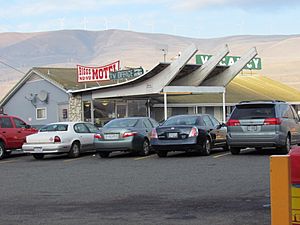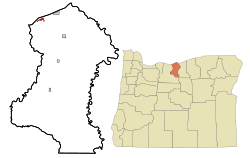Biggs Junction, Oregon facts for kids
Quick facts for kids
Biggs Junction, Oregon
|
|
|---|---|
|
Census-designated place (CDP)
|
|

Biggs Nu-Vu Motel
|
|

Location of Biggs Junction, Oregon
|
|
| Country | United States |
| State | Oregon |
| County | Sherman |
| Area | |
| • Total | 0.89 sq mi (2.30 km2) |
| • Land | 0.89 sq mi (2.30 km2) |
| • Water | 0.00 sq mi (0.00 km2) |
| Elevation | 384 ft (117 m) |
| Population
(2020)
|
|
| • Total | 5 |
| • Density | 5.64/sq mi (2.18/km2) |
| Time zone | UTC-8 (Pacific (PST)) |
| • Summer (DST) | UTC-7 (PDT) |
| ZIP code |
97065
|
| Area codes | 458 and 541 |
| FIPS code | 41-06400 |
| GNIS feature ID | 2407848 |
Biggs Junction is a small community in Sherman County, Oregon, in the United States. It's considered a "census-designated place" (CDP) by the government. This means it's a special area set up for counting people, even though it's not an official city or town.
This community is located on the south side of the Columbia River. It's right where two major highways meet: Interstate 84 (I-84) and U.S. 97. U.S. 97 crosses the river into Washington using the Sam Hill Memorial Bridge. In 2010, only 22 people lived here, and by 2020, the population was 5.
Contents
History of Biggs Junction
The area known as Biggs Junction has an interesting past.
How Biggs Got Its Name
The original "Biggs" was a station on the Union Pacific Railroad. It was named after W. H. Biggs, a landowner who settled in Sherman County in 1880. He was born in Ohio in 1831. The railroad line was first owned by the Oregon Railroad and Navigation Company.
Spanish Hollow and the Oregon Trail
In 1885, the railroad station at Biggs was called Spanish Hollow. This name came from a nearby canyon. People say the canyon was named because a Spanish ox died there long ago. This happened during the time of the Oregon Trail. The Oregon Trail was a famous path pioneers used to travel west. It ran parallel to what is now U.S. 97. Biggs was a special place for these travelers. It was the first spot where they would see the mighty Columbia River after their long journey overland.
The Junction's Origin
The current community of Biggs Junction got its name from this old train station. It's also named for its location at the busy meeting point, or "junction," of I-84 and U.S. 97. There used to be a post office in Biggs, which opened in 1884 but closed in 1954.
Geography of Biggs Junction
Biggs Junction covers about 0.8 square miles (2.3 square kilometers) of land. It's located directly across the Columbia River from another community called Maryhill, Washington.
Population of Biggs Junction
| Historical population | |||
|---|---|---|---|
| Census | Pop. | %± | |
| 2020 | 5 | — | |
| U.S. Decennial Census | |||
In 2000, there were 50 people living in Biggs Junction. By 2020, the population had become much smaller, with only 5 people living there.
Economy of Biggs Junction

Biggs Junction is an important place for travelers and businesses.
A Stop for Travelers
The main business in Biggs Junction is serving as a place for people to rest and refuel. This is especially true for traffic along the two major highways, I-84 and U.S. 97. It's one of the biggest truck stops on the Oregon part of I-84. This means many trucks and cars stop here for gas, food, and a break.
Wheat Shipping Center
Biggs Junction is also a key spot for shipping wheat. There are large grain storage elevators here. These are tall buildings where wheat is stored after it's harvested. From here, the wheat can be shipped out using river barges on the Columbia River or by train.
Biggs Jasper Discovery
The area around Biggs Junction is famous for a special type of rock called Biggs jasper. This is a beautiful, semi-precious gemstone. Local Native Americans used this jasper a long time ago. It was "rediscovered" in 1964. Road crews found it while they were building I-84 and fixing bridges after a big flood that year.
See also
 In Spanish: Biggs Junction para niños
In Spanish: Biggs Junction para niños
 | Anna J. Cooper |
 | Mary McLeod Bethune |
 | Lillie Mae Bradford |

